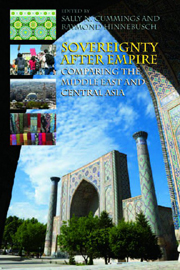Book contents
- Frontmatter
- Contents
- Acknowledgments
- Notes on the Contributors
- 1 Introduction
- SECTION I Histories of Empire and After
- SECTION II Paths to Sovereignty: Views from the Core and Periphery
- SECTION III Empire and Domestic Sovereignty
- SECTION IV Empire and Popular Sovereignty
- SECTION V Empire and External Sovereignty
- 13 Empire and State formation: Contrary Tangents in Jordan and Syria
- 14 Rentierism, Dependency and Sovereignty in Central Asia
- 15 Tajikistan: From de facto Colony to Sovereign Dependency
- 16 Conclusions
- Bibliography
- Index
15 - Tajikistan: From de facto Colony to Sovereign Dependency
from SECTION V - Empire and External Sovereignty
Published online by Cambridge University Press: 12 September 2012
- Frontmatter
- Contents
- Acknowledgments
- Notes on the Contributors
- 1 Introduction
- SECTION I Histories of Empire and After
- SECTION II Paths to Sovereignty: Views from the Core and Periphery
- SECTION III Empire and Domestic Sovereignty
- SECTION IV Empire and Popular Sovereignty
- SECTION V Empire and External Sovereignty
- 13 Empire and State formation: Contrary Tangents in Jordan and Syria
- 14 Rentierism, Dependency and Sovereignty in Central Asia
- 15 Tajikistan: From de facto Colony to Sovereign Dependency
- 16 Conclusions
- Bibliography
- Index
Summary
People disagree about whether the Soviet Union was an empire and even about the definition of empire. Yet several points are clear. The concepts of empire and colony had negative connotations in Soviet rhetoric. Despite or even because of that in the last years of the Soviet era, advocates of change and even members of the political establishment in various non- Russian republics began to assert what had hitherto been absolutely taboo: that relations between the central government and the non-Russian republics had an imperial-colonial character. The motives for such declarations were varied, not solely to speak truth to power, but breaking the taboo was a dramatic change regardless of the motives. After the demise of the Soviet Union, the Union republics became sovereign states under international law, but the discussions of colonial grievances retained some utility. At the same time, some measure of dependence on Moscow persisted in the formally independent states. The characteristics of this dependence resembled those of former Western colonies on their imperial metropolis.
The Soviet Union as Empire
The debate about whether the Soviet Union was an empire is complicated by the polemical use of the term, especially in the context of the Cold War. The Soviet Union accused the major Western powers of imperialism, while some Western critics of the Soviet Union reciprocated by calling it an empire to highlight its oppressive character.
- Type
- Chapter
- Information
- Sovereignty after EmpireComparing the Middle East and Central Asia, pp. 304 - 325Publisher: Edinburgh University PressPrint publication year: 2011

